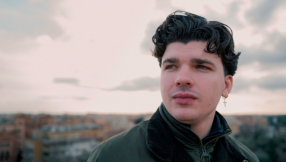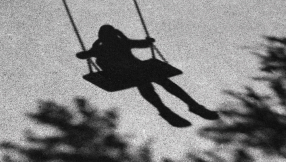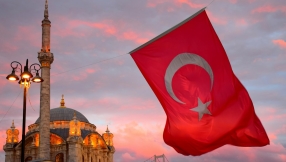Russia's annexation of the Crimea in 2014 and its deployment of the 'little green men' – incognito military who backed separatist rebels – to take over the east of Ukraine caused a global strategic and diplomatic crisis that is not over yet.
In the context of a shooting war that has left thousands dead and brought lasting poverty and instability in its wake, the struggle for control of Ukraine's churches might seem trivial. But it's being bitterly fought, and is inseparable from the wider conflict.
At its roots are questions of nationalism. Ukraine has three Orthodox groupings, the Moscow Patriarchate loyal to Russia, the Kiev Patriarchate loyal to Ukraine, and the much smaller Ukrainian Autocephalous Church. In Orthodox understanding, this is completely irregular, as there should be just one church per country. The division between Moscow and Kiev goes back to the early days after the breakup of the Soviet Union, when Kiev's Metropolitan Filaret formed the breakaway Kiev Patriarchate in the early 1990s after a campaign against him orchestrated by Moscow.
The poisonous atmosphere between Ukraine and Russia since the conflict that began in 2014 has only exacerbated the struggle between the churches. Ukraine's President Poroshenko has pushed for the Kiev Patriarchate to become independent (or 'autocephalous', self-governing). For Vladimir Putin's Russia – in the person of the Russian Orthodox Church's head, Patriarch Kirill – this would represent a humiliating defeat. Kirill, and his 'foreign secretary' Metropolitan Hilarion of Volokolamsk, have waged a relentless propaganda war against the Kiev Patriarchate, which they accuse of planning a spiritual land-grab. According to the ROC, Ukraine's independence does not automatically mean that it needs an independent church; they point out that the ROC itself includes largely self-governing churches in several other former Soviet republics.
During the last fortnight, however, the situation has escalated. In the Orthodox world, the ultimate spiritual prestige lies with the Patriarch of Constaninople – now Istanbul – which was the centre of the Orthodox world's political power until the city's fall in 1453. Ecumenical Patriarch Bartholomew is still the first among equals among the heads of Orthodox Churches and regarded as their representative and spiritual leader, though he has no direct jurisdiction over them. However, while he does have extensive authority over dioceses and churches throughout the world, his economic and political power is dwarfed by that of Patriarch Kirill, who thanks to generous support from President Putin controls a church that is not only very wealthy but increasingly assertive. So behind the struggle between Moscow and Kiev, there is another struggle for precedence in the Orthodox world between Moscow and Constaninople – and it is Ecumenical Patriarch Bartholomew who has asserted, in the teeth of opposition from Kirill, that he has the right to rule on the claims of the Kiev Patriarchate that Ukraine's Orthodox Christians should be independent from Moscow.
On September 7, the Ecumenical Patriarchate announced it had appointed two 'exarchs' or representatives, one from the US and one from Canada, to prepare the ground for the granting of autocephaly. The ROC issued a string of statements on its website condemning the move. It was 'a gross violation of the church canons prohibiting bishops of one Local Church to interfere in the internal life and affairs of another Local Church'; Bartholomew had acted 'basely and treacherously' (Hilarion); sending the exarchs was 'a gross and unprecedented incursion by one Local Church into a distant canonical territory' (Bishops of the Russian Church Abroad).
As an indication of how far back Orthodox memories go, and the genuine outrage Russian and Russian-affiliated Orthodox feel about Bartholomew's refusal to kowtow, Hilarion's interview and statement are worth reading. He draws on the full history of Eastern Christianity to argue that Bartholomew has exceeded his authority – which his supporters, of course, thoroughly contest – and warns that the Ecumenical Patriarch is leading the Church to schism. 'The Russian Church will not recognize this autocephaly, of course. We will have no other choice but to break the communion with Constantinople. It means that the Patriarch of Constantinople will no longer have the right to call himself, as he is doing now, "the leader of the 300 million Orthodox Christians worldwide." At least half of the Orthodox Christians will not recognize him at all. By his actions he will, in fact, split the world Orthodoxy.'
He says Constantinople has been attempting to expand its authority in a 'papistical' way for the last hundred years, that is, ruling Orthodoxy as the Pope rules the schismatical Catholics.
Furthermore, in singularly intemperate language, he appears to claim Ukraine itself is on the verge of collapse, with implications of a potential Russian takeover: Bartholomew 'realises that the days of the current Ukrainian authorities are numbered, that some other force will come, which will not endorse these papistical claims of Constantinople. That is why they are trying to do their dirty deed as soon as possible.'
In his statement of September 10, Hilarion goes, if possible, even further. He accuses Bartholomew of declaring war on Orthodox unity and says he will 'bear personal responsibility before the judgment of God and the judgment of history'.
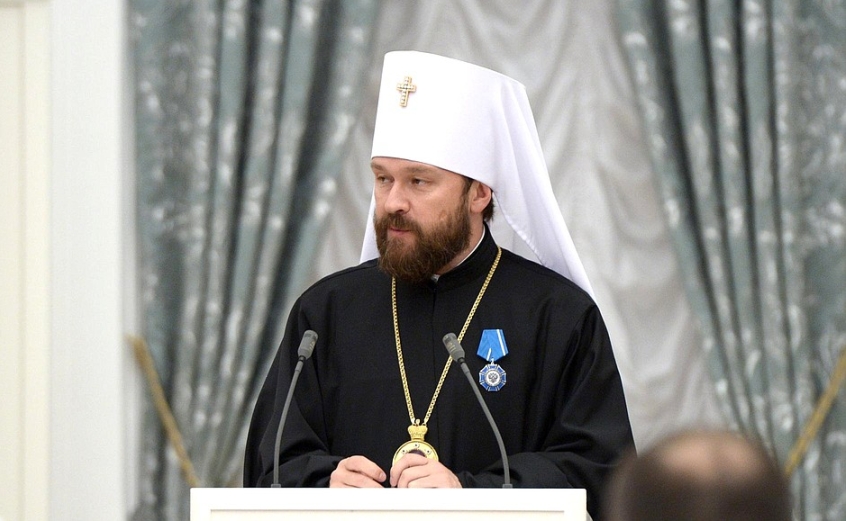
However, though the granting of autocephaly to Ukraine's Orthodox is not yet a done deal, the assumption appears to be that it will happen. As the ROC points out, this would be against the wishes of the bishops of Ukraine's majority Moscow Patriarchate, who say they don't want it (there are 12,000 Moscow church communities and 5,000 Kiev church communities).
According to the Ukrainian think tank the Razumkov Centre, however, 41 per cent of Orthodox believers support the creation of an autocephalous church, as opposed to 21 per cent who oppose it. In the Western-backed region support rises to 60.5 per cent, with only 12 per cent against, reflecting the attitude to Russia provoked by its invasion of Ukrainian terrority. Many others, according to the poll, are indifferent. However, the figures may indicate that while the bishops, appointed in happier times, might feel a residual loyalty to Moscow, their congregations are far less likely to do so.
What lies ahead, then, for the unity of the Orthodox Church? It has, in fact, rarely been a united or harmonious body, not least because it is organised on national lines and politics is never far away. A Holy and Great Council held in Crete in 2016, decades in the planning and set to bring all 14 autocephalous churches together for significant consultation and declarations, was sabotaged at the last moment by a string of defections from churches that decided they could not sit down with their fellow Orthodox while certain issues were outstanding. Among them was the ROC, whose decision to stay away was widely seen as a carefully timed and deliberate blow at the authority of Bartholomew, whose brainchild the Council was.
If Bartholomew does grant Ukraine autocephaly, he might well find himself with the support of most of the Orthodox world, judged in terms of territory. It is hard, however, to see how in that case the ROC could row back from Hilarion's explicit threats – and a breach in communion between Moscow and Constantinople is a very big deal indeed.
Illustrating the depth of distrust between the two camps is a split second clip from a video taken at a meeting between Ecumenical Patriarch Bartholomew and Patriarch Kirill in Istanbul on August 31, a presumed last ditch attempt by Kirill to talk Bartholomew out of granting autocephaly.
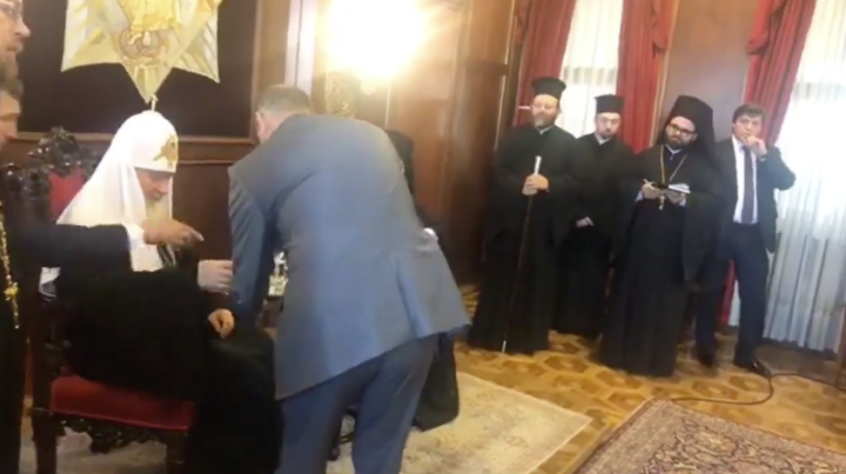
They are having tea together, and as Kirill is reaching out for a cup a functionary darts forward and indicates the one he should take instead. Reports immediately began to circulate on Ukrainian social media of an attempt to poison Bartholomew. The report was widely refuted by participants, including Bishop Daniel Zelinsky, one of Bartholomew's exarchs to Ukraine, who said: 'A few days ago, social media and even TV and news channels reported that supposedly there was an attempt to present a glass of poisoned water to the Ecumenical Patriarch by the employee of the Ecumenical Patriarchate... Not true... I got to know Alexander pretty well, and had a glass of water with him today in the presence of the Consul General of Ukraine Oleksandr Gaman and Consul Max Vdovychenko... The water was great...'
While the Archbishop of the Patriarchate of Constantinople, Job Getcha, said the allegation was a 'stupid fake'.
Of course: but when relations have deteriorated so far that such suggestions even have to be refuted, it's hard to see a way back.
Follow Mark Woods on Twitter: @RevMarkWoods










